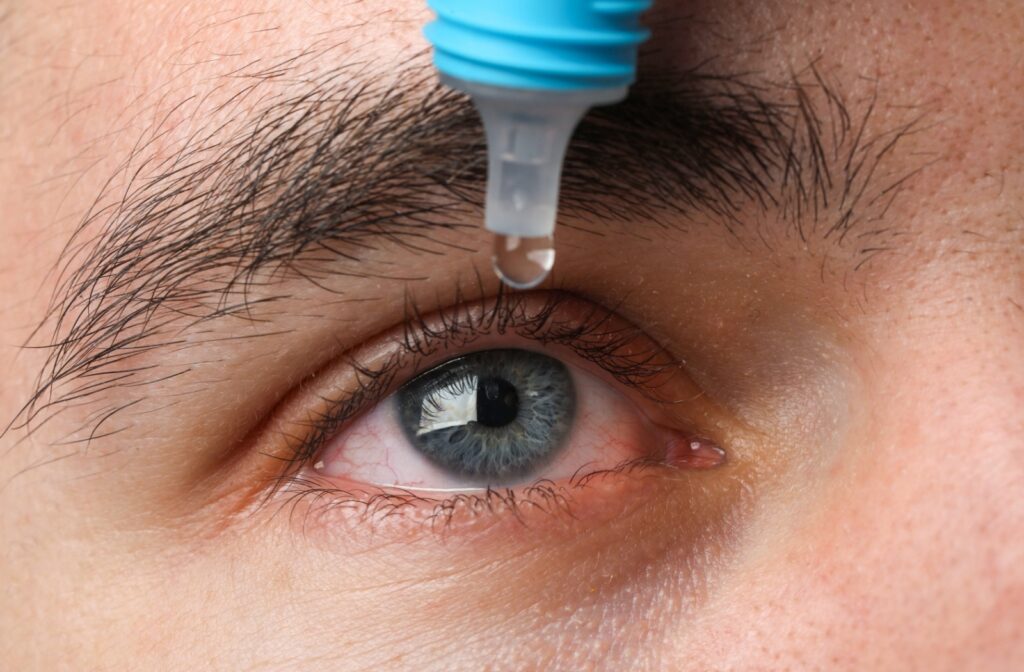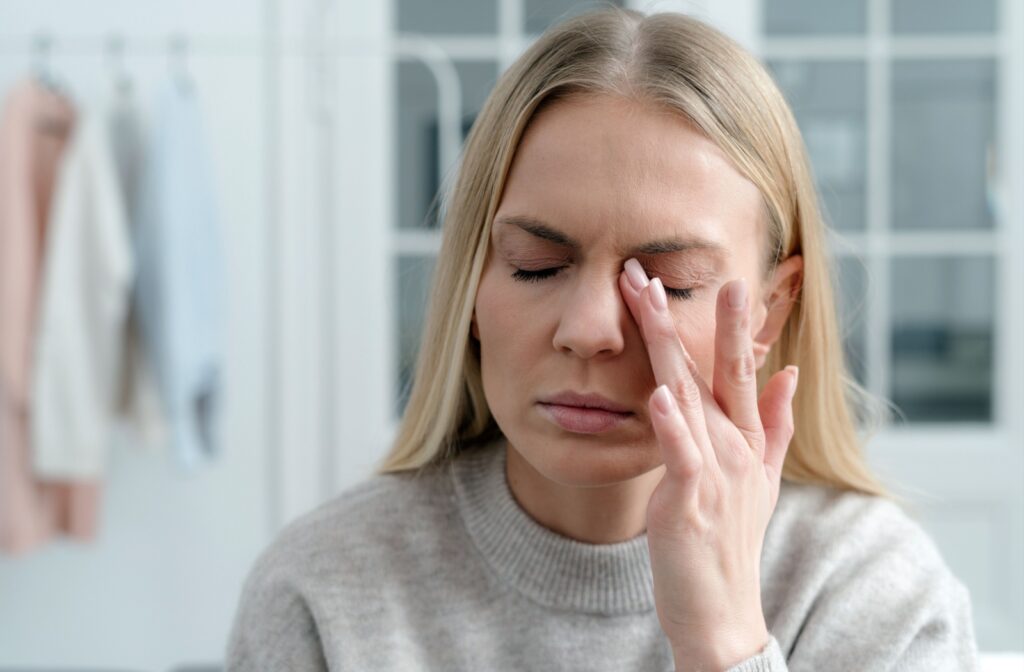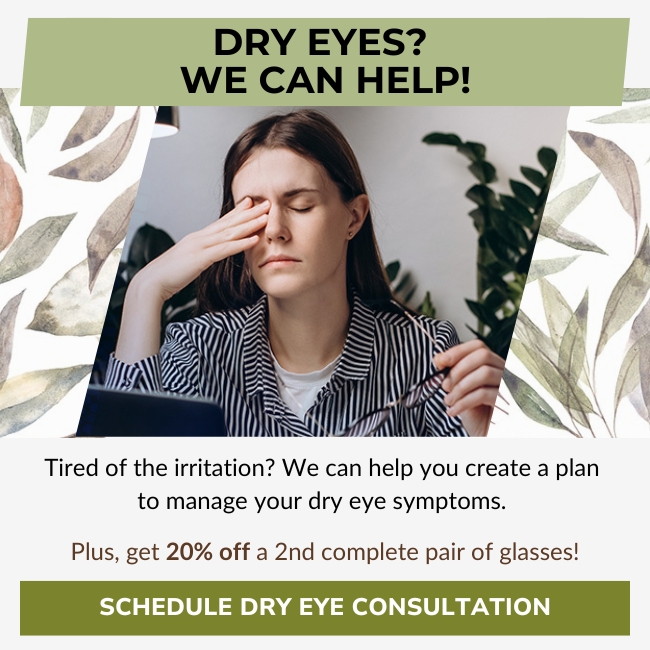Dry eye, a common condition affecting millions globally, can range from a minor annoyance to a significant health issue.
One frequently asked question is: Can dry eyes cause blindness? While the short answer is “not directly,” understanding the implications of dry eye syndrome is important for maintaining overall eye health.
Therefore, it’s essential to manage and treat dry eye symptoms promptly to prevent any serious outcomes. Regular eye exams with your eye care professional at Dr. Chris Schell can help detect and address dry eyes early, making sure of overall vision health.
What is Dry Eye Syndrome?
Dry Eye Syndrome, also known as dry eye disease, is a condition where the eyes don’t produce sufficient tears or the tears evaporate too quickly, leading to inadequate lubrication on the surface of the eye. This insufficient lubrication can result in a range of symptoms, including:
- Burning or stinging sensation
- Redness
- Itchiness
- Blurred vision
- Excessive watering
- A feeling of grittiness or having something in the eye
- Sensitivity to light
- Difficulty wearing contact lenses
Causes of Dry Eye Syndrome
Several factors can contribute to dry eye syndrome, including:
- Aging: Tear production tends to decrease with age.
- Environmental Conditions: Exposure to wind, smoke, or dry climates can cause tears to evaporate quickly.
- Screen Time: Prolonged use of digital devices can lead to reduced blinking, which contributes to dryness.
- Medical Conditions: Diseases such as Sjogren’s syndrome, rheumatoid arthritis, and diabetes can affect tear production.
- Medications: Certain medications, including antihistamines, decongestants, blood pressure medications, and antidepressants, can reduce tear production.
- Hormonal Changes: Hormonal changes, particularly in women during menopause, can lead to dry eyes.
Potential Complications
While dry eyes themselves are unlikely to cause blindness, they can still lead to several conditions that significantly impair vision if left untreated. Understanding these potential complications is crucial for anyone experiencing symptoms of dry eye syndrome.
Corneal Damage
The cornea is the transparent front part of the eye that plays a vital role in focusing your vision. Severe and chronic dry eye can damage the corneal surface. Without adequate lubrication, the cornea can become irritated and develop tiny abrasions. Over time, these minor injuries can escalate into more serious problems.
Corneal damage not only affects visual clarity but can also increase sensitivity to light and cause significant discomfort.
Infections
Tears are a critical component of the eye’s defence system, helping to wash away debris and providing essential nutrients and antibodies that protect against infections. Reduced tear production compromises this natural barrier, making the eyes more susceptible to infections such as:
- Conjunctivitis: Inflammation or infection of the outer membrane of the eyeball and the inner eyelid, commonly known as pink eye.
- Keratitis: Inflammation or infection of the cornea, which can be caused by bacteria, viruses, fungi, or parasites.
If left untreated, these infections can become severe, potentially leading to vision loss.
Inflammation
Persistent inflammation due to dry eye can damage ocular tissues over time. This ongoing inflammation can result in:
- Chronic Redness and Irritation: Continuous inflammation can make the eyes appear red and feel constantly irritated, impacting daily comfort and overall quality of life.
- Meibomian Gland Dysfunction: The meibomian glands produce the oily layer of the tear film that prevents evaporation. Chronic inflammation can lead to dysfunction of these glands, further exacerbating dry eye symptoms.
Inflammation not only aggravates dry eye symptoms but can also create a vicious cycle where inflammation leads to more dryness and more dryness leads to increased inflammation.

Preventative Measures
Managing dry eyes effectively requires an approach that addresses the underlying causes and provides relief from symptoms.
Artificial Tears
Artificial tears are over-the-counter eye drops designed to lubricate the eyes and provide temporary relief from dryness. They come in different viscosities:
- Low-viscosity artificial tears: These are watery and provide quick relief, but may require frequent application.
- High-viscosity artificial tears: These are gel-like and offer longer-lasting relief, but can cause temporary blurred vision.
Lifestyle Changes
Several lifestyle changes can help reduce the symptoms of dry eyes:
- Reducing Screen Time: Prolonged use of digital devices can decrease blink rates, leading to dryness. Taking regular breaks using the 20-20-20 rule (every 20 minutes, look at something 20 feet away for at least 20 seconds) can help maintain moisture in the eyes.
- Humidifiers: Using a humidifier, especially in dry indoor environments, can add moisture to the air, reducing tear evaporation and keeping the eyes more comfortable.
- Wearing Sunglasses: Sunglasses, particularly wraparound styles, can protect the eyes from wind, dust, and UV rays—all of which can exacerbate dryness.
- Staying Hydrated: Drinking plenty of water helps maintain overall hydration, which is essential for tear production.
At-Home Treatments
Several effective at-home treatments can help manage dry eyes:
- Bruder Mask: This moist heat eye compress can open the oil glands in the eyelids, providing relief from dry eyes. To use, simply microwave the mask for 20-25 seconds and apply it to the eye area for 10 minutes. The Bruder mask is safe for frequent use, self-hydrating, washable, and reusable.
In-Clinic Treatments
For more severe cases, in-clinic treatments may be necessary:
- Meibomian Gland Dysfunction (MGD) Treatment: When the small glands in your eyelids that produce the oily layer of tears become clogged, they cause instability in the tear film. Treatments targeting MGD can help restore the balance of your tear composition.
- IPL Therapy: Intense Pulsed Light therapy (IPL) uses pulses of light to liquefy and release hardened oils that have clogged glands in the eyelids. IPL is a non-invasive treatment focusing on the area below the eyes and helps stimulate the meibomian glands to improve tear quality.
- Gentle Massage Therapy: This non-invasive treatment method features a gentle massage to soothe dry eye symptoms and stimulate new collagen production, which can aid in skin tightening and improve the appearance of fine lines and wrinkles.
Importance of Early Diagnosis
Early diagnosis and management of dry eye is essential. Regular exams with an eye care professional can help detect dry eyes early and prevent complications.
Dry Eyes and Vision Health
While dry eyes are unlikely to cause blindness directly, they can lead to serious complications if not managed properly. Maintaining good eye health through regular exams, lifestyle adjustments, and appropriate treatments can help prevent severe outcomes.
Don’t let dry eyes affect your quality of life any longer. At Dr. Chris Schell, we offer comprehensive and personalized dry eye treatments to help you find lasting relief. Whether you’re dealing with mild discomfort or severe symptoms, our expert team is here to provide the care you need. Book your appointment with us today!



